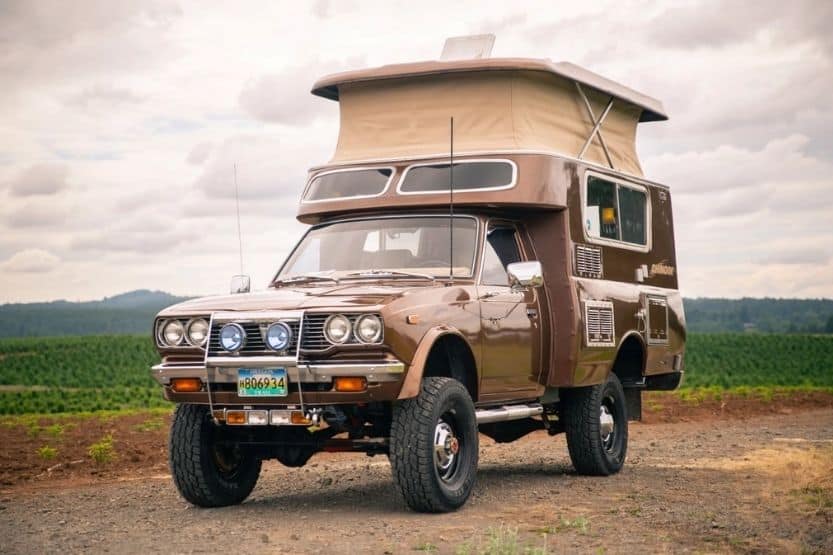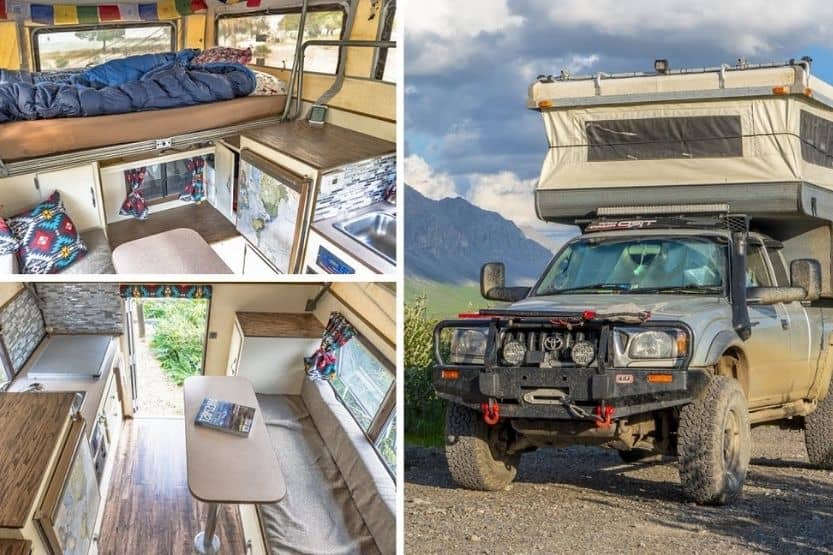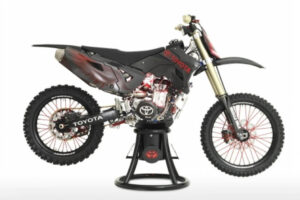When it comes to traveling in a camper, the Toyota camper has been a popular choice for many years. When describing the Toyota camper, it can be hard to define it because of its unique history.
During its peak, the Toyota camper was manufactured in more than 60 different styles and models. It started with mini motorhomes, such as Winnebago, Coachmen, and Chinook, attached to a Toyota chassis.
Then pickup trucks like the Toyota Tacoma and vans like the Toyota Sienna were converted by motoring enthusiasts into road shelters.
On average, Toyota motorhomes have a length of 18 to 22 feet, a fuel economy of 11 to 16 mpg, and an engine life of over 200,000 miles.
Read on to learn more about the Toyota camper specs and their unique history. We’ll look at the specs and history of the Toyota Chinook camper van, Toyota Sienna camper van, Toyota Tacoma truck camper, and the Toyota 4Runner camper.
About the Toyota Camper

Toyota made about 60 different Toyota camper styles and models during its peak, such as mini motorhomes like:
- Winnebago,
- Coachmen, and
- Chinook, attached to a Toyota chassis.
Eventually, motorists converted pickup trucks like the Toyota Tacoma and vans like the Toyota Sienna into road shelters.
On average, Toyota motorhomes have the following features:
- A length of 18-22 feet,
- A fuel economy of 11-16 mpg, and
- Engine life of over 200,000 miles.
The Toyota camper does not refer to a specific model. Rather, it is a collective term that encompasses a diverse selection of motorhomes.
Toyota campers did not start as motorhomes. Instead, they began as a small pickup truck with a camper shell, which another company manufactured.
The first motorhomes were those with a Toyota chassis with a cab-over design. It has a room sitting in front and above the cab, providing enough space for up to five people.
When Toyota RVs’ production stopped over three decades ago, motorhome enthusiasts have converted their vans into temporary shelters. This included the Toyota Sienna, Proace, and HiAce, among other models.
A Brief History of the Toyota Camper
It all started in the 1970s. Manufacturers like Dolphin, Winnebago, and Sunrader produced small motorhomes, and they were connected to a Toyota truck.
Production of the camper vans peaked in the 1980s. Different large RV producers have entered the picture. The motorhomes expanded and reached a length of up to 22 feet.
It was also when there were recalls in the United States because of an unsafe axle resulting from overloading.
In 1989, the V6 engine was introduced as a part of the Toyota chassis, resulting in enhanced performance. The increased horsepower made camper vans more powerful.
However, in 1994, Toyota stopped producing the chassis that connects to campers from third-party manufacturers. The company cited safety issues as the main reason for ceasing production.
While the classic Toyota camper vans are no longer produced, you can still see some sold by individual sellers. If you want to live in a Toyota motorhome, a good alternative with considering is to buy a van and convert it into a rolling shelter.
Differences Between Regular RVs and Modern Mobile Homes
What Makes the Toyota Camper Great?
If you are not yet convinced that a Toyota camper is a great investment, below are some of the benefits that might make you change your mind:
1. They Are Compact
At an average length of 18 to 22 feet, the best thing about a Toyota camper van is that they are small to navigate roads with ease. It isn’t like driving a truck. It is more convenient to use, even when you are in small spaces.
2. They Offer Plenty of Space
Being compact does not necessarily equate to space restrictions. Many of the Toyota camper vans can fit up to five people. There is enough space for a folding couch or bed, as well as a kitchen. Some can even fit a small bathroom!
3. They Are Fuel-Efficient
Living in a motorhome does not need to be expensive. Even if you are always moving, no need to spend a fortune on gas. Toyota campers are known for being fuel-efficient, with an average mileage of 11 to 16 mpg. Anyone who drives an RV will know that such is a great number.
4. They Are Long-Lasting
If you are lucky enough to get one of Toyota’s original campers, the engine is one of its best assets. They will keep on moving up to 200,000 miles. Pay attention to proper care and maintenance, and you can be confident that the motor will never fail you.
5. They Offer Endless Opportunities for Customization

Another good thing about Toyota campers is that you have plenty of options for personalization. The sky’s the limit when it comes to customization. You can do many things to combine both form and function in your motorhome.
Toyota Chinook Camper
For vintage Toyota campervans, the Toyota Chinook is perhaps one of the most popular. It has been a household name and a popular choice among budget-conscious buyers.
The Chinook started production in 1973 through a partnership between Toyota and a California-based company. They were initially producing about 300 units per month.
When it was introduced, it costs only $5,000. Demand soon picked up, and it became more popular, increasing the price to $6,000. Despite such, it was still pocket-friendly, especially considering its fuel mileage.
Specs and Features
1. Engine
The heart of the Chinook is the 2.2-liter 20R SOHC in-line engine. It was first introduced in the 1975 model, providing the camper with 90 horsepower and 122 lb-ft of torque. This allowed the RV to perform well both in city and highway traffic.
In the 1991 iteration of the Chinook, Toyota made significant improvements on the engine. Some of the performance upgrades included a remote oil cooler, dual side-draft carburetors, a camshaft, and a three-core aluminum radiator.
2. Mileage
The Toyota Chinook has a mileage of 20 mpg, one of the best during its time. No wonder it is a popular choice because of its fuel efficiency. It can go further without using too much fuel, allowing users to save money.
There was a global energy crisis when Toyota released the Chinook in the 1970s. This prompted a higher demand for more fuel-efficient modes of transportation, including the Chinook. It is also one of the reasons why more than 50,000 Chinooks were sold until 1994.
3. Transmission
The Chinook’s powerful engine is connected to either a three-speed automatic transmission or a four-speed manual transmission.
4. Brakes
To offer excellent drivability, the Chinook uses high-performing brakes. It has a front disc brake and a rear drum brake.
5. Shock Absorption
From urban to rural drives, the Chinook promises exceptional comfort. Thanks to its suspension system, you won’t feel most of the bumps. It has double wishbone coil springs in the front. Meanwhile, the rear has semi-elliptical leaf springs.
Toyota Tacoma Camper
Since Toyota stopped manufacturing chassis with a motorhome from a third-party manufacturer, you have to explore other possibilities if you want to live on the road.
Among others, consider buying a pickup and converting it into a camper. With this, it is hard to go wrong with the Toyota Tacoma truck camper.
This pickup truck was introduced in 1995, just a year after Toyota stopped its production of campers. The first generation was a compact pickup, while the newer generations are bigger, making them more ideal for a mini home on wheels.
Today, a Toyota Tacoma costs at least $26,250. It can seat up to five people and has a wide rear that you can creatively use for your camper home.
Specs and Features
1. Engine
The Toyota Tacoma camper is available in different variants, and each will come with a different engine. At the most basic, it has a 2.7-liter DOHC 16-valve four-cylinder engine, which delivers a power of 159 HP and torque of 180 lb-ft.
On the other hand, for a more powerful alternative, there is also a model that comes with a 3.5-liter V6 DOHC 24-valve direct-injection Atkinson cycle engine. It has a maximum power of 278 HP, 6,000 rpm, and 265 lb-ft of torque.
2. Payload Capacity
If you plan to convert your Tacoma pickup into a rolling home, you must know its weight capacity. The rear-wheel-drive can tow a total weight of 6,800 pounds. On the other hand, the four-wheel version has a pulling capacity of 6,500 pounds.
3. Technologies
To demonstrate innovation, Tacoma is packed with some of the latest innovations you will find in a pick-up truck.
Some of the notable technologies include the following:
- A pre-collision system with pedestrian detection,
- Dynamic rear cruise control,
- Multi-information display, and smart key system, and
- It even allows voice control.
Toyota Sienna Camper

The biggest selling point of the Toyota Sienna is that it is easier to convert into a motorhome. One of our favorite features is the split and stow third-row seats. In a single motion, you can fold the backseat, making it easy to convert the interior into a sleeping or living area.
Aside from the easy folding seats, this is also perfect as a Toyota camper van because of its power outlet capable of handling up to 1,500 watts. This is enough to power a cooking appliance.
Today, the price of the Toyota Sienna camper starts at $34,460. The most expensive model is priced at $49,900.
Specs and Features
1. Engine
Like many vehicles from Toyota, the Sienna has an impressive engine. It is fitted with a 2.5-liter DOHC 16-valve engine. It delivers 245 HP.
2. Gas Mileage
Based on EPA ratings, the Toyota Sienna has a fuel economy of 36 mpg both on the highway and city. This is pretty much impressive considering the performance of other minivans.
3. Technologies
Toyota has the reputation of introducing novel technologies in its cars, and it is not any different from the Toyota Sienna camper. Some of its most notable features include a multimedia system with dynamic navigation, remote connect, and Toyota Safe Sense 2.0.
Other Notable Options for a Toyota Camper
As we end this quick guide, below are some other remarkable alternatives for a Toyota camper van:
1. Toyota 4Runner Camper
At a length of only 16 feet, a Toyota 4Runner camper is a great motorhome conversion option. You need to open the back, add cooking gear, table, mattress, and other storage spaces.
As a full-size SUV, the 4Runner is untamable. From paved roads to muddy trails, it handles almost anything. The power comes from its 4-liter DOHC 24-valve engine, which has a five-speed automatic transmission.
Interested in owning a Toyota 4Runner? The current price starts at $36,590, with high-end models costing as much as $50,570.
2. Toyota Proace Camper
A compact workhorse – this is how many motoring enthusiasts describe the Proace. Despite being small, it accommodates nine people, making it another great option for a Toyota camper.
In 2018, Toyota released the Proace Lerina. It has a 2.0-liter 4-cylinder turbo diesel. It is available in both 120 and 180 HP variants.
This camper van comes with a pop-up roof and two seats at the front that you can turn. The rear bench, meanwhile, can be converted into a bed and has storage space underneath. There is also a small kitchen, portable toilet, and water tank.
The Lerina is not certified for sale in the United States. It is only available in the United Kingdom with a base price of £42,000.
3. Toyota HiAce Camper
Designed as a commuter vehicle, the Toyota HiAce Camper is another great option for a camper van. First released in 1967, it is now available in various configurations to suit different needs. It can sit up to 15 people.
The van has a length of up to 232.9 inches and a roof height of up to 89.8 inches, making sure enough space.
It is not available in North America. In Australia, however, it costs around $44,806.
Conclusion – Toyota Camper
Toyota created about 60 different Toyota camper styles and models during its peak, such as mini motorhomes like:
- Winnebago,
- Coachmen, and
- Chinook, attached to a Toyota chassis.
Eventually, motorists customized pickup trucks like the Toyota Tacoma and vans like the Toyota Sienna into road shelters.
On average, Toyota motorhomes have the following features and specs:
- A length of 18-22 feet,
- A fuel economy of 11-16 mpg, and
- Engine life of over 200,000 miles.
Without a doubt, the Toyota camper is an icon. The Toyota Chinook to Toyota Tacoma to Toyota Sienna changed the concept of living on the road. It is smaller than traditional RVs without compromising space.
Whether you are going on a quick weekend adventure or want to live like a nomad in a van, the Toyota camper is a great investment!
Related reading:
Toyota Truck Models – Tacoma and Tundra [12 Types]
Small Toyota Truck – What Is It Called? [Plus History]
How to Keep Mice Out of a Camper? (7 Tips)

![1st Gen Tacoma Specs and Review [1995-2004 Toyota Tacoma] 1st Gen Tacoma](https://roadsumo.com/wp-content/uploads/2022/05/1st-gen-Tacoma-150x150.jpg)
![2nd Gen Tacoma Specs and Review [2005-2015 Toyota Tacoma] 2nd Gen Tacoma](https://roadsumo.com/wp-content/uploads/2022/05/2nd-gen-Tacoma-150x150.jpg)
![Auto LSD on a Toyota Tundra, Tacoma, RAV4, and more [Guide] Auto LSD on a Toyota Tundra](https://roadsumo.com/wp-content/uploads/2022/09/Auto-LSD-on-a-Toyota-Tundra-150x150.jpg)





